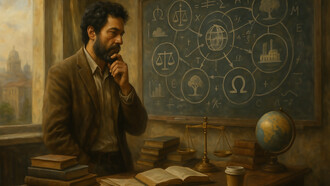In Albert Camus's novels, we see the recurrent figure of the exile, of a man struggling to partake in society. Meursault and Rieux, in The Stranger and The Plague, respectively, display these struggles. Meursault deals with the death of his mother and struggles to find any meaning in his life, and therefore cannot use reason to defend it in court. Rieux must face a world of chaos and exile, attempting to maintain order through constant work and dealing with the unrewarding reality of life.
Camus shares similar struggles in his American Journals. Throughout these journals, he writes of feelings of alienation and exile despite finding himself in crowds surrounded by friends and admirers. The journals, one from his 1946 travels in the United States and Canada and the other during his South American travels in 1949, follow him as he reflects on the cultures of the people he interacts with.
Early on, we notice the absurdity of his feelings. On his first impression of New York City, he writes, "Deep down, I feel calm and indifferent, as I generally do in front of spectacles that don't move me." In the following entry, he describes its culture as "admirable inhumanity".
These statements reflect absurdism through their expressions of meaninglessness. If we pull from Camus's piece, The Myth of Sisyphus, we see that he interprets life as irrational and contradictory, as absurd, and if we are to face it, we must accept it and find joy within it. Despite making these claims, we see how Camus struggles to live by them, furthering the absurdity of life.
In his American Journals, his feelings tend to contradict the spectacles he witnesses. When attending a macumba in Brazil, he finds himself overwhelmed by the dancing and the music and the crowded tent, escaping into the night, claiming "I like the night and the sky better than the gods of men". Here, we see how the vastness and emptiness absent from life bring him more comfort than fellow humans.
However, soon after, he writes that "Nature suffocates man" as he writes of the Brazilian cities surrounded by jungle and ocean. For Camus, there seems to be no correct answer regarding man's relationship to anything non-man, though there does not seem to be a wrong answer, either.
And, while he seems to find solace, albeit a suffocating solace, in the non-human, he finds a paradoxical loneliness in the company of other people. Reflecting as it rains in New York, he writes, "Even if I hugged all the beings of the world to my breast, I would remain unprotected". The alienation continues throughout. He struggles to find meaning despite seeming to understand that life has no meaning. He claims that he makes continuous efforts to "seem normal". Later, attempting to recover from the depression of his travels, he finds himself "amidst people who, from friendship or hysteria, perceive nothing of the state I'm in and thus make it a little worse".
Camus views himself as an exile; despite having placed himself in this position so that he may give lectures, he is incredibly alone. The alienation presses itself upon him so much that he begins to write intense, misanthropic entries. One states, "To live is to hurt others, and through others, to hurt oneself... How can we manage not to touch anything? To find what ultimate exile?". Here, Camus expresses his depression and, therefore, his reaction to the absurd. Interacting with others harms them and, in turn, ourselves; though, to stray away from all humanity not only seems impossible but also paradoxical, for it would bring more pain.
However, while he sees himself as an exile, and he struggles with the isolation, we do see brief moments of joy. While in South America, he writes, "Dinner alone. Faintly, the sound of an orchestra. Exile has its pleasures". This relates to the misanthropic entry because he finds himself alone at last and enjoying the simple pleasures of music. Moreover, the music is "faint," indicating how he finds peace in the quiet. Though still, he isn't alone. People make music; the music is coming from an orchestra made of other humans, who are giving him joy. While humans do hurt each other, and while this does inflict pain upon us, moments of shared joy can be found throughout.
Another positive moment seems to arise when Camus meets with Spanish expatriate and philosopher José Bergamín, a figure known for his contradictory acceptance of Catholicism and Communism. Camus writes, "I love this kind of man," and, after speaking together, they decide to enjoy a walk and end up at a café. While the experience at the café proves dissatisfactory because of some of the other people there, Camus seems to have enjoyed the company of Bergamín, especially since his exilic traits allowed him to relate more to him.
Traveling puts a weight on one's soul, especially if done alone. Home distances itself from you just as you distance yourself from it; it becomes a memory, and the nostalgia from it yearns to pull you back to it. While abroad, I shared many of the sentiments reflected by Camus in these journals. I alienated myself because I felt alienated, and I found solace in very few things. The simple pleasures that arose when I found myself alone, such as street music outside my window, the laughter of fellow tourists on the seashore, or sitting isolated within nature, kept me going and helped me find joy in the meaningless void of life.
The meaning of the absurd lies in its meaninglessness. And, for one to find joy and motivation in such a void, they must accept it as it arises, even if it proves fleeting. Especially if it proves fleeting. Meaninglessness does not need to mean anything negative; it's all about how one approaches it. And, as Camus shows us, it's a constant struggle, though it proves worthwhile if you allow it to.















